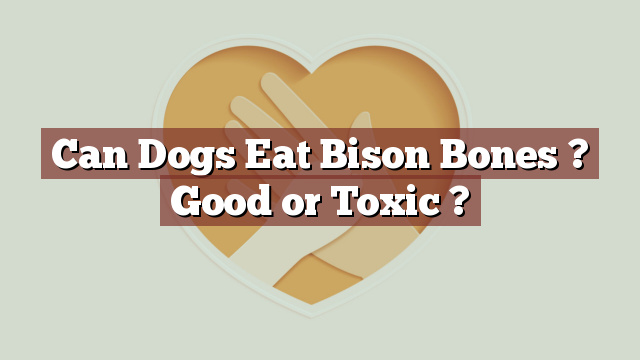Can Dogs Eat Bison Bones? Good or Toxic?
As pet owners, it is crucial to be knowledgeable about the foods that are safe for our furry friends to consume. Can dogs eat bison bones? This question arises when considering whether or not to include bison bones in a dog’s diet. In this article, we will examine the nutritional value of bison bones for dogs, explore their safety and potential toxicity, as well as discuss the risks and benefits associated with feeding bison bones to dogs.
Nutritional Value of Bison Bones for Dogs
Bison bones are known to be a great source of essential nutrients for dogs. These bones are rich in calcium, phosphorus, and other minerals that contribute to good bone health. Additionally, bison bones provide dogs with essential amino acids, which are the building blocks of proteins. These amino acids play a crucial role in the development and maintenance of a dog’s muscles, skin, and coat.
Can Dogs Eat Bison Bones? Safety and Toxicity
Yes, dogs can eat bison bones; however, it is important to exercise caution and take certain precautions. Raw bison bones, especially large ones, may pose a risk to a dog’s dental health. They can cause tooth fractures, broken teeth, or other oral injuries if the dog chews on them too aggressively. Therefore, it is recommended to supervise dogs while they are chewing on bison bones to prevent any potential mishaps.
Furthermore, cooked bison bones should never be given to dogs. Cooking causes the bones to become brittle, increasing the risk of splintering. These sharp bone fragments can lead to serious injuries, such as punctures in the digestive system when swallowed. It is vital to always offer raw or appropriately processed bison bones to dogs if you choose to include them in their diet.
Potential Risks and Benefits of Bison Bones for Dogs
While bison bones offer numerous benefits to dogs, it is essential to be aware of potential risks associated with their consumption. The main concern is the risk of dental injuries from bones that are too hard or chewed too vigorously. Additionally, some dogs may have sensitivities or allergies to the protein in bison bones, which can lead to digestive issues or skin problems. Therefore, it is advisable to introduce bison bones gradually and monitor your dog’s reaction to them.
On the flip side, chewing on bison bones can provide dogs with mental stimulation, alleviate boredom, and promote dental hygiene. The act of gnawing on bones helps remove plaque and tartar buildup, reducing the risk of dental diseases. Moreover, the physical action of chewing can be soothing for dogs, particularly puppies who are teething.
What to Do if Your Dog Eats Bison Bones
If your dog accidentally ingests cooked bison bones or experiences any adverse reactions after consuming raw bison bones, it is crucial to seek veterinary assistance immediately. Contact your veterinarian and provide them with detailed information about the incident. They will be able to assess the situation and advise you on the necessary steps to ensure your dog’s well-being.
Conclusion: Weighing the Pros and Cons of Feeding Bison Bones to Dogs
In conclusion, while dogs can eat bison bones, it is important to take precautions and consider the potential risks and benefits. Raw bison bones provide dogs with essential nutrients, promote dental health, and offer mental stimulation. However, it is crucial to avoid giving dogs cooked bones, as they can splinter and cause serious injuries. Remember to supervise your dog while chewing on bones and consult with a veterinarian if you have any concerns or questions. By making informed decisions and prioritizing your dog’s safety, you can incorporate bison bones into their diet responsibly.
Thank you for investing your time in exploring [page_title] on Can-Eat.org. Our goal is to provide readers like you with thorough and reliable information about various dietary topics. Each article, including [page_title], stems from diligent research and a passion for understanding the nuances of our food choices. We believe that knowledge is a vital step towards making informed and healthy decisions. However, while "[page_title]" sheds light on its specific topic, it's crucial to remember that everyone's body reacts differently to foods and dietary changes. What might be beneficial for one person could have different effects on another. Before you consider integrating suggestions or insights from "[page_title]" into your diet, it's always wise to consult with a nutritionist or healthcare professional. Their specialized knowledge ensures that you're making choices best suited to your individual health needs. As you navigate [page_title], be mindful of potential allergies, intolerances, or unique dietary requirements you may have. No singular article can capture the vast diversity of human health, and individualized guidance is invaluable. The content provided in [page_title] serves as a general guide. It is not, by any means, a substitute for personalized medical or nutritional advice. Your health should always be the top priority, and professional guidance is the best path forward. In your journey towards a balanced and nutritious lifestyle, we hope that [page_title] serves as a helpful stepping stone. Remember, informed decisions lead to healthier outcomes. Thank you for trusting Can-Eat.org. Continue exploring, learning, and prioritizing your health. Cheers to a well-informed and healthier future!

